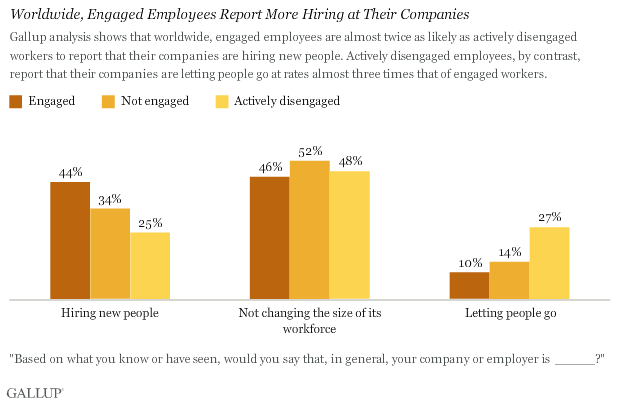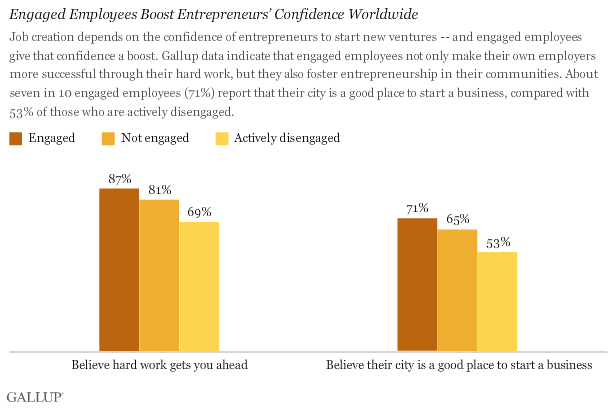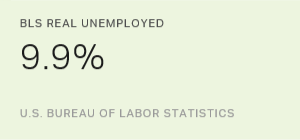During the Great Recession, 8.7 million U.S. workers lost their jobs, as did millions more around the world. But businesses are starting to hire again, according to engaged employees of those companies.
Engaged employees foster entrepreneurship in their communities.
Gallup's just-released shows that worldwide, engaged employees are almost twice as likely as those who are actively disengaged to report that their companies are hiring new people or expanding the size of their workforces. By contrast, actively disengaged employees report that their companies are letting people go at rates almost three times that of the engaged population.

The bad news is that only 13% of employees are engaged in their jobs -- that is, emotionally involved in and committed to their work -- according to Gallup's 2011-2012 study of employees in 142 countries worldwide. These are the employees most likely to make positive contributions to their companies, whether by attracting and retaining new customers, driving innovation, or simply spreading their positivity to coworkers. The finding that the vast majority of employees worldwide are emotionally disconnected from their workplace and less likely to be productive represents a potent obstacle to job growth and economic recovery in many countries.
"It goes in circles: When people are more engaged, their companies do better, and those companies have room to add more people. When employees are not engaged or are actively disengaged, their companies don't do as well, they don't hire new workers, and they may even lay off the workers they have," says Sangeeta Agrawal, ���۴�ýworkplace research manager. "But when the ratio between engaged employees and actively disengaged employees improves, the whole company improves. That, in turn, can improve whole economies."
And the fewer obstacles to economic recovery, the better. Millions of people are still unemployed or underemployed, so it's vital that business and government leaders learn how to attract and retain talented people who can create new businesses or help existing ones expand.
People with good jobs rate their present and future lives positively
Engaged workplaces are most likely to be engines of job creation around the world. This insight is crucial to businesses, communities, and countries affected by the recession. ���۴�ýanalysis consistently shows that people with "good jobs" -- defined as jobs that offer steady work averaging 30 or more hours per week and a paycheck from an employer -- are more likely than those in other employment categories to rate their present and future lives positively. Both the quantity and quality of available jobs are essential to a community's capacity to meet its residents' needs, and the prevalence of "good jobs" is a major component of economic productivity in most countries.
Gallup's Payroll to Population (P2P) measure, which tracks the percentage of such jobs among the overall population in more than 140 countries, is more strongly related to GDP per capita than any other employment metric -- including unemployment. Thus, P2P offers an accurate measure of the percentage of people who are contributing to a country's economic energy. It also indicates the extent to which a country's economic activity relies on the talents and efforts of its people, rather than on other sources -- such as the export of natural resources, which fluctuates with global demand and is likely to be unsustainable in the long term.
P2P figures tend to be highest in developed economies, where businesses benefit from healthier, better-educated workforces. Iceland is at the top of the list with 60% of its residents working full time for an employer. The lower end consists mostly of countries in sub-Saharan Africa; in Mali, Burkina Faso, and Chad, just 5% of residents are included in the P2P measure.
Countries striving to find sources of sustainable growth need a critical mass of high-energy businesses and organizations to bolster job creation and economic opportunity. That energy is more likely to be found in workplaces where employees are engaged in their jobs. And that energy is organic. It's the result of employees' basic psychological needs being fulfilled and the belief that they will be rewarded or recognized for the discretionary effort they devote to their jobs.
Engaged employees embrace the benefits of hard work
Around the world, almost nine in 10 engaged employees agree that hard work gets you ahead, versus about seven in 10 actively disengaged workers. That belief -- and resulting hard work -- has tangible outcomes. Workplaces with higher levels are more likely to experience growth in part because engaged employees are, on average, more productive, less likely to be absent, and less likely to leave their organizations.
Another spillover effect of engagement is that engaged employees not only make their own employers more successful, they also foster entrepreneurship in their communities, according to ���۴�ýdata. Job creation depends on the confidence of a city's inhabitants to start new ventures -- and engaged employees give that confidence a boost. About seven in 10 engaged employees (71%) report that their city is a good place to start a business, compared with 53% of those who are actively disengaged.
"Disengaged workers are not happy with what they're doing, and they spread that unhappiness to their peers at work and in their own social circles. Entrepreneurs in those social circles won't get any boost in their confidence or hope from them," says Agrawal. "But engaged workers spread enthusiasm, which fuels economic power. They themselves are more energized and enthusiastic about the business environment, and they broadcast that enthusiasm to the entrepreneurs they know. And those entrepreneurs are more likely to start companies that, in turn, will create good jobs."

As the pressure intensifies for local leaders to provide good jobs and increase economic opportunities, engaging employees has never been more urgent. Engaged workforces benefit the entire community through increased economic optimism among residents and improved performance outcomes among businesses.
As ���۴�ýCEO Jim Clifton notes in his book , "Successful local companies are not just engines for job creation but also engines for local social and community improvement." Through their effect on business outcomes, efforts to improve employee engagement have the potential to create the economic energy necessary to build stronger, happier communities -- and more robust national economies
